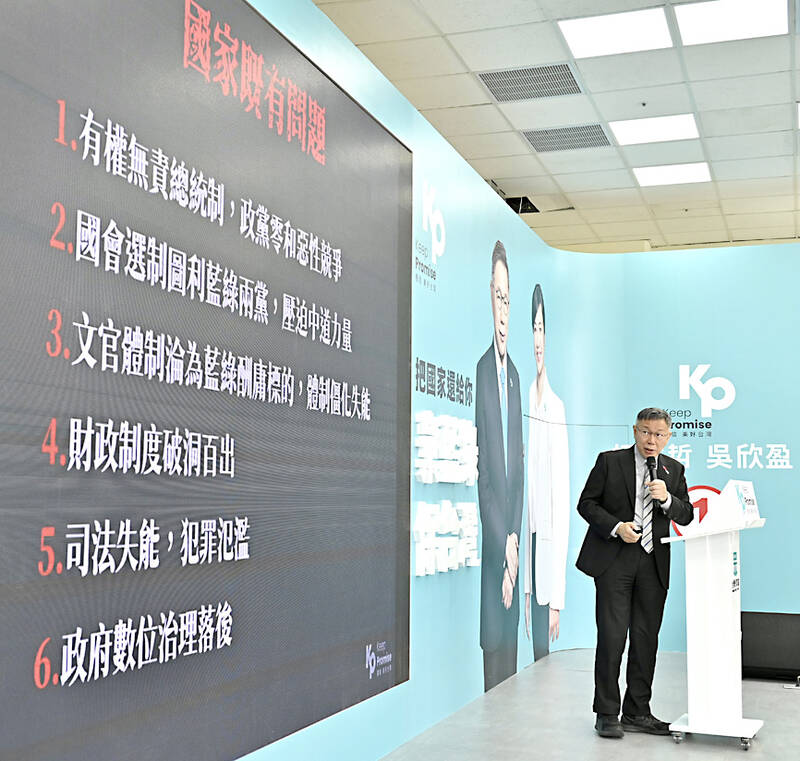The government must overcome six major problems, including a rigid and disabled civil service system, Taiwan People’s Party (TPP) Chairman and presidential candidate Ko Wen-je (柯文哲) said yesterday as he again called for the adoption of a parliamentary system.
Ko told a news conference at his campaign headquarters in New Taipei City that his main reason for running for president is to create an inclusive society and improve national governance.
Hopefully, Taiwan would become a united and harmonious society with a national leader who honestly faces the nation’s problems and comes up with practical solutions, he added.

Photo: Tu Chien-jung, Taipei Times
Among the problems with the current system is that the president has “power without responsibilities, causing political parties to engage in zero-sum, cutthroat competition,” while the legislative system benefits the Chinese Nationalist Party (KMT) and the Democratic Progressive Party (DPP) while oppressing a middle force, he said.
Moreover, jobs in civil service have become reward posts for the KMT and the DPP to hand out, he said, adding that the system is too rigid.
The fiscal system is also “full of flaws, the judicial system is disabled and crime is rampant,” Ko said, adding that there is a lack of “digital governance.”
Hopefully, the government would transition into a parliamentary system, but as amendments to the Constitution are difficult to pass, it should start by developing “constitutional conventions,” such as requiring legislative approval of the president’s pick for premier and ministerial appointments, he said, adding that the president should be required to report to the Legislative Yuan periodically to answer questions.
The legislature should be based on “mixed-member proportional representation,” Ko said, adding that the voting age should be lowered to 18 and the minimum age to run for office should be lowered to 20.
The electoral threshold for the allocation of legislator-at-large seats should be lowered to 3 percent from 5 percent to facilitate the growth of small parties, he said.
High-ranking civil servants, and the directors and supervisors of state-owned enterprises should be subject to “open selection,” with the number of political appointments limited, Ko said.
Civil service exams should be improved with more focus on aptitude and oral tests, while civil servants’ salaries should be increased to boost morale, he said.
He also proposed reconstructing the allocation of subsidies and the distribution of tax revenue from the central government, because in most cases less than 50 percent of local government finances are self-financed.
The regulations for the special budgets of the central government should be amended to enforce fiscal discipline, he said.
The former Taipei mayor also proposed setting up a permanent judicial reform commission and a national judicial science committee.
Moreover, TPP legislative candidate Huang Kuo-chang’s (黃國昌) suggestions for amendments to the Criminal Code should be implemented to more effectively fight crime, he added.
Ko said that he supports a digital national ID card, making the Personal Data Protection Committee a second-level independent agency and establishing a national digital transformation agency.

A relatively large earthquake may strike within the next two weeks, following a magnitude 5.2 temblor that shook Taitung County this morning, the Central Weather Administration (CWA) said. An earthquake struck at 8:18am today 10.2km west of Taitung County Hall in Taitung City at a relatively shallow depth of 6.5km, CWA data showed. The largest intensity of 4 was felt in Taitung and Pingtung counties, which received an alert notice, while areas north of Taichung did not feel any shaking, the CWA said. The earthquake was the result of the collision between the Philippine Plate and the Eurasian Plate, the agency said, adding

Snow fell in the mountainous areas of northern, central and eastern Taiwan in the early hours of yesterday, as cold air currents moved south. In the northern municipality of Taoyuan, snow started falling at about 6am in Fusing District (復興), district head Su Tso-hsi (蘇佐璽) said. By 10am, Lalashan National Forest Recreation Area, as well as Hualing (華陵), Sanguang (三光) and Gaoyi (高義) boroughs had seen snowfall, Su said. In central Taiwan, Shei-Pa National Park in Miaoli County and Hehuanshan National Forest Recreation Area in Nantou County saw snowfall of 5cm and 6cm respectively, by 10am, staff at the parks said. It began snowing

HOLIDAY EXERCISE: National forest recreation areas from north to south offer travelers a wide choice of sights to connect with nature and enjoy its benefits Hiking is a good way to improve one’s health, the Forestry and Nature Conservation Agency said, as it released a list of national forest recreation areas that travelers can visit during the Lunar New Year holiday. Taking a green shower of phytoncides in the woods could boost one’s immunity system and metabolism, agency Director-General Lin Hwa-ching (林華慶) cited a Japanese study as saying. For people visiting northern Taiwan, Lin recommended the Dongyanshan National Forest Recreation Area in Taoyuan’s Fusing District (復興). Once an important plantation in the north, Dongyanshan (東眼山) has a number of historic monuments, he said. The area is broadly covered by

Global bodies should stop excluding Taiwan for political reasons, President William Lai (賴清德) told Pope Francis in a letter, adding that he agrees war has no winners. The Vatican is one of only 12 countries to retain formal diplomatic ties with Taiwan, and Taipei has watched with concern efforts by Beijing and the Holy See to improve ties. In October, the Vatican and China extended an accord on the appointment of Catholic bishops in China for four years, pointing to a new level of trust between the two parties. Lai, writing to the pope in response to the pontiff’s message on Jan. 1’s